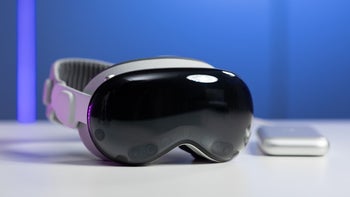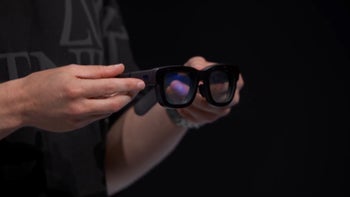Meta picks MediaTek over Qualcomm for its AR glasses, as the company’s head of AR leaves

I don’t think that it’s any secret that Meta is the undisputed leader of XR, at least for the time being and definitely in the west. The Quest 2 was a fan-darling, but ever since the Quest 3 joined the best VR headset rankings, it feels like Meta really stepped up its game.
But still: XR has a long road ahead of itself! And while we can spend all day talking about how eye and hand tracking could — and should! — be improved or about the fact that MR features need to become more prominent, I’d much rather do something else:
Remind you all that Meta has smart AR glasses in the works too. And I’m certainly not referring to the RayBan collab. In fact, Meta seems to have teamed up with MediaTek for a custom bit of silicon especially designed for its first pair of smart AR glasses.
But will the project become the best it ever could now that Don Box — Meta’s head of AR — has left?

So! Where have you heard about this Don Box guy before? Well, simple: this is the brains behind the Xbox One operating system. And then he is also responsible for a bunch of cool things for Windows too. In my book, that definitely makes you a great team member, but if that is the case, then why did Meta let go of him?
Well, unfortunately, Box had to leave for personal reasons. And while that’s always a bummer and we hope that he has a bright future ahead of him, I must ask: does this endanger Meta’s AR glasses project?
Now, given Don’s position, I’m guessing that he’s been involved with the Quest 3’s AR and MR capabilities and if that’s the case, we can certainly call his work impactful. The Quest 3 feels like a true leap forward for MR, with more promised to come in 2024.
But! The Quest 3 is powered by a Qualcomm chip and just as Box leaves, MediaTek spoke about this new partnership with Meta, revolving around the development of a SoC, destined to crown Meta’s first pair of smart AR glasses.
Okay, so, us techies? We’re familiar with Qualcomm and its Snapdragon line of products. They are often found among not only some of the best phones on the market, but just in case you didn’t know: Qualcomm makes XR chips too, and its latest and greatest Snapdragon XR2 Gen 2 is part of the reason why the Quest 3 is so awesome.

But does that mean that MediTek can’t keep up? Well, its processors are more budget-friendly for sure. While that makes them less cutting edge by definition, it doesn’t make them any less capable for what they set out to achieve.
Meta says that Don Box’s departure won’t impact it’s roadmap for the future and while another smart guy on the team could always lead to further improvements, I don’t think the lack there of endangers the future of Meta’s upcoming AR glasses.
Moreover, VR and AR are different beasts. A lot of computational power is required to render 3D objects in an immersive fashion, but depending on Meta’s idea of an AR pair of specs, a chip from MediaTek could not only mean a great end result, but also one that’s more affordable for consumers.
Of course — for both — only time will tell, and said time will start coming when Meta truly announces its AR specs. After we’ve seen what they’re all about in concept, we can start commenting on the choice of processor. And still: until we’ve seen Mark Zuckerberg’s “magnum opus” in action, there’s only room for hype and excitement.
Okay, and possibly for a bit of criticism, but we’ll talk about that after a trailer starts existing.
But still: XR has a long road ahead of itself! And while we can spend all day talking about how eye and hand tracking could — and should! — be improved or about the fact that MR features need to become more prominent, I’d much rather do something else:
But will the project become the best it ever could now that Don Box — Meta’s head of AR — has left?

Sure, these are smart, but they aren't AR-level smart.
So! Where have you heard about this Don Box guy before? Well, simple: this is the brains behind the Xbox One operating system. And then he is also responsible for a bunch of cool things for Windows too. In my book, that definitely makes you a great team member, but if that is the case, then why did Meta let go of him?
Well, unfortunately, Box had to leave for personal reasons. And while that’s always a bummer and we hope that he has a bright future ahead of him, I must ask: does this endanger Meta’s AR glasses project?
Now, given Don’s position, I’m guessing that he’s been involved with the Quest 3’s AR and MR capabilities and if that’s the case, we can certainly call his work impactful. The Quest 3 feels like a true leap forward for MR, with more promised to come in 2024.
Okay, so, us techies? We’re familiar with Qualcomm and its Snapdragon line of products. They are often found among not only some of the best phones on the market, but just in case you didn’t know: Qualcomm makes XR chips too, and its latest and greatest Snapdragon XR2 Gen 2 is part of the reason why the Quest 3 is so awesome.

So this is what a Qualcomm chip can let you do. Question: do we need this same experience on a pair of AR glasses?
But does that mean that MediTek can’t keep up? Well, its processors are more budget-friendly for sure. While that makes them less cutting edge by definition, it doesn’t make them any less capable for what they set out to achieve.
Moreover, VR and AR are different beasts. A lot of computational power is required to render 3D objects in an immersive fashion, but depending on Meta’s idea of an AR pair of specs, a chip from MediaTek could not only mean a great end result, but also one that’s more affordable for consumers.
Of course — for both — only time will tell, and said time will start coming when Meta truly announces its AR specs. After we’ve seen what they’re all about in concept, we can start commenting on the choice of processor. And still: until we’ve seen Mark Zuckerberg’s “magnum opus” in action, there’s only room for hype and excitement.







Things that are NOT allowed: